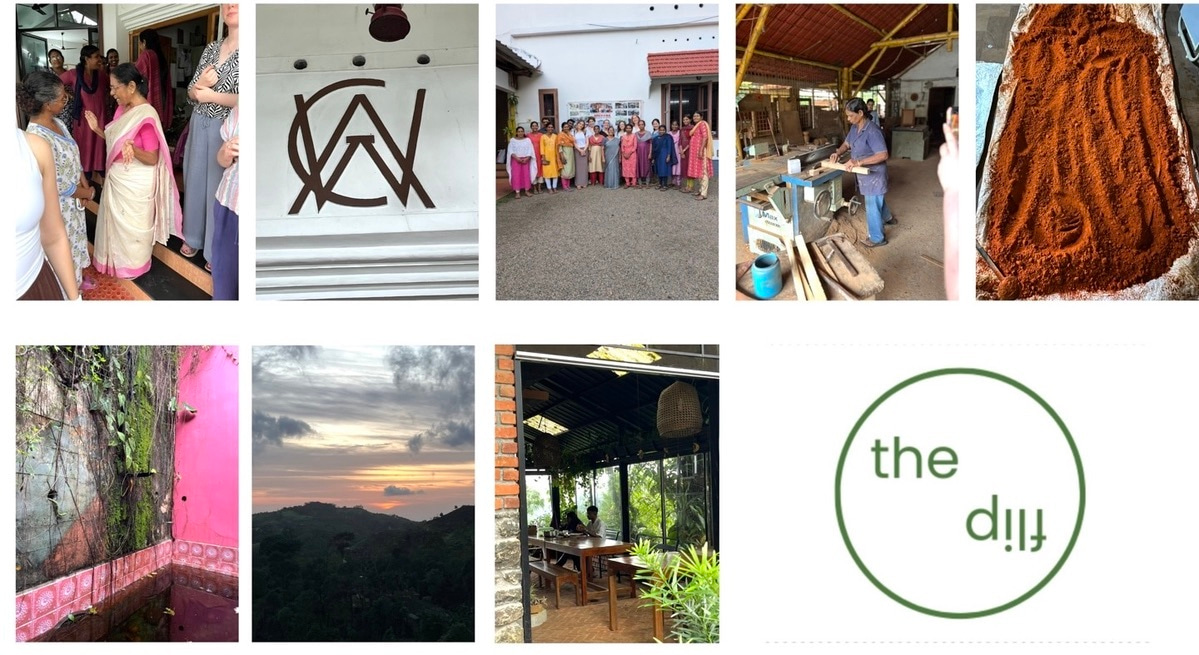
We spent week four of CraftHER with the incredible Archana Women’s Centre, established and managed as the Kerala wing of the Jyothi Jeeva Poorna Trust (JJPT), registered under the Indian Trust Act 1882. This trust is run by the Secular Institute: The Oblate Missionaries of Mary Immaculate. The founder and director of the centre, whom we had the privilege of meeting and spending time with, is Miss Thresiamma Mathew.
Archana originates from Miss Thresiamma Mathew’s experiences working with women in the construction trade who were paid less than men for doing the same work. The philosophy of the centre focuses on economically empowering women through training them in skilled work, initially focusing on the construction and carpentry industries - traditionally considered male sectors of work. Archana consider their cause to be rooted in social as well as economic empowerment. Their message is that “no job is strictly for a male or female” - women can work in every sphere. Some of their core stated objectives as an organisation are as follows: To aid the integrated development of women in society; to impact skill development training and ensure employment opportunities in non-conventional trades for women.
Archana are devoted to reinterpreting the female role in society through better integrating women into traditionally male work spaces. It is in this way that I found them to differ from SEWA in their feminist philosophy as an organisation. Where SEWA look to empower women by giving them training in traditional craft such as paper making or bamboo weaving - Archana train women in non-traditional work like construction and carpentry. Although both seek to empower women economically - they have very different feminist perspectives.
Both SEWA and Archana recognise the state of female social responsibility to the home and build their organisations in response to this. From what I have observed, SEWA looks for ways to economically empower these women in spite of their social condition where Archana seeks to dismantle the domesticity of their social condition through economic empowerment in non-traditional spaces. Where SEWA focus on payment for domestic work, Archana look to expose women to other kinds of work.
I am not saying that one method of promoting female economic self sufficiency is more effective than another, or preface my own preference for one version of feminism over another. However, I would say that one of the prime points of assistance that SEWA were calling on us to attend to as part of our consultancy was the lack of youth engagement with their organisation. It was notable that none of the core members of SEWA were in their twenties. By way of contrast, Archana’s staff was made up of women of all ages - some being in their twenties having studied degrees prior to joining the organisation.
Without making assumptions, the spectrum of ages within Archana perhaps points to a more modern approach to female economic self sufficiency - women can do what men can do and perhaps in order to shift the female social position from being solely concerned with domestic or familial responsibility women SHOULD be doing what men do. This way of thinking I believe to be how we get more female CEOs, more female entrepreneurs and more female heads of state to name but a few traditionally male dominated work positions.
Over the course of the week we visited some of Archana’s different female clusters of workers. We saw how traditional Indian spices such as turmeric, chilli powder or samba were made, packaged and sold in their shop. We visited trades that varied in range from fish farming to carpentry and rope making. To end our week with Archana, similarly to SEWA, we compiled a list of recommendations and improvements they could make primarily regarding their social media. They received our recommendations with gratitude and I feel honoured to have met such an incredible group of women!
We rounded off an incredible week in Kottayam with a visit to the magical “littleflowerfarms” in Vagamon, Kerala. The drive up the mountain was bracing, the food home-grown and nourishing, the hospitality as warm as the campfire we all sat around given the notable drop in temperature with drastically increased altitude! We even got a dip in the waterfall and a sight of the full moon over the mountains. Breathtaking!
In other news my own brand “the flip” is being born! Samples made, fabric purchased, labels ordered - continue to watch the space as I launch my first marketing campaign via instagram this September - pre-orders are encouraged!





Please sign in
If you are a registered user on Laidlaw Scholars Network, please sign in